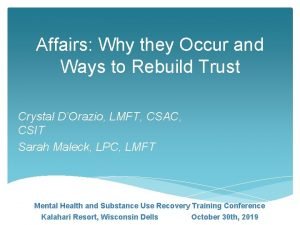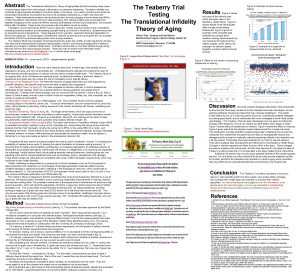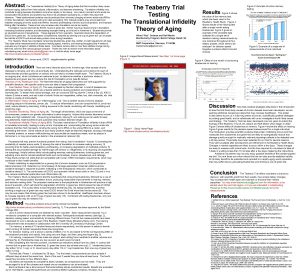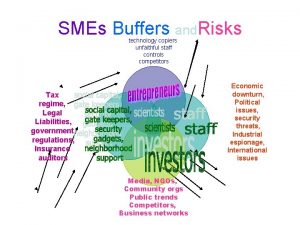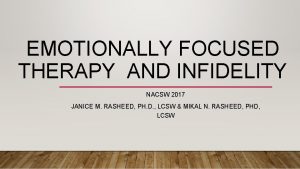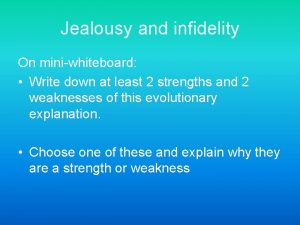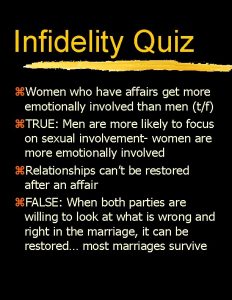Infidelity Theory and Treatment The Unfaithful Partner Should





















































- Slides: 53

Infidelity Theory and Treatment

The Unfaithful Partner: Should I leave my partner or end the affair? Should I tell my partner? Love Triangles in Clinical Practice The Betrayed Partner: Should we try to recover from the affair or should I end the marriage? The Affair Partner: Will my partner ever leave his or her spouse for me?

The Origins of Love Triangles Freud’s Oedipal Conflict: The child’s desire for an exclusive relationship with the desired parent and jealousy of the rival parent. Freud’s Primal Scene: The child experiences the parents’ sexual relationship as sexual betrayal by the desired but unfaithful parent.

Sexual Strategies Theory: Humans are strategic pluralists who possess both short-term and long-term reproductive strategies. The Evolution of Love Triangles Parental Investment Theory: The greater the parental investment the choosier in picking a mate. The lesser the parental investment the more indiscriminate in picking a mate.

Is Monogamy Natural? The Evolution of Biparental Care: Why women prefer sexual exclusivity. The Evolution of Fatherhood: Why men desire paternity certainty to invest in children.

Life History Strategy § Fast Life History: Mature early, high mating investment, low parental investment, quantity of offspring over quality of offspring. § Slow Life History: Late maturity, high parental investment, quality of offspring over quantity of offspring

Infidelity: Getting the Best of Both Worlds § Men can have multiple children with multiple partners through casual sex but still invest in raising children with one or more faithful wives when paternity certainty would be high. § Women can maintain a stable relationship with a man who invests in her and her children while obtaining resources, quality sperm, or a replacement husband by having affairs.

Nonprocreative Sexuality § Sex to affirm mate value § Sex to cement an attachment bond § Sex to obtain resources § Sex to get revenge § Non-heterosexual reproductive strategies § Inclusive Fitness

The Evolution of Sexual Morality § Mate Guarding Among Primates: Why sexual jealousy may be a cross-species and cross-cultural universal § Reciprocal Altruism and the evolution of revenge motivation – the need to punish cheaters § Sexual Morality Sexual Hypocrisy, and the Self-Serving Bias: Why my infidelity is OK but yours isn’t.

The Therapist’s Sexual Morality § Address Patient’s Perception of Your Moral Biases § Acknowledge Self-serving aspects of everyone’s moral biases § Help patients look at the trade offs of potential paths of action in terms of costs and benefits § Different strokes for different folks § Respect differences in risk tolerance § You only live once – the trade-off between immediate gratification and potential long-term consequences.

Attachment Style and Infidelity The Origin of Adult Attachment The Origin of Attachment Styles

Anxious Attachment Style § Separation protest and the dread of abandonment § Infidelity in search of secure attachment, emotional intimacy, reassurance, and validation § Making your partner jealous § Getting even

Avoidant Attachment Style § Splitting love and lust § The fear of intimacy § Infidelity as escape from boredom § It’s only sex. It doesn’t mean anything.

Attachment Style and Communication Style § Anxious attachment style and fault finding/ controlling/ demanding communication style – You’re too distant, withholding, and uncommunicative. § Avoidant attachment style and stonewalling, hostile detachment, and contempt – You’re too needy.

Attachment Style and Mentalization § Mentalization: The ability to reflect on the mental state of self and others and to appreciate the impact of one’s own behavior on a partner’s mental states § Insecure attachment and low mentalization: The inability to mentalize sexual betrayal. The inability to mentalize your partner’s sexual needs.

An Emotion Focused Approach to Insecure Attachment § Why the securely attachment are more faithful § Foster trust and secure attachment among couples trying to recover from infidelity § Vulnerability and attachment related defenses: How to help couples let down their walls.

Men’s Interest in Casual Sex Differences in the Motivation for Infidelity Women’s Interest in Emotional Intimacy

Men’s Sex Drive § Men think about sex more often, experience more frequent sexual arousal, have more frequent and varied fantasies, desire sex more often, desire more partners, § Masturbate more, want sex sooner, are less able or willing to live without sexual gratification, initiate more and refuse less sex, expend more resources § Make more sacrifices for sex, desire and enjoy a broader variety of sexual practices, have more favorable and permissive attitudes toward most sexual activities, have fewer complaints about low sex drive in themselves (but more about their partners), and rate their sex drives as stronger than women. § There were no measures that showed women having stronger drives than men.

Nature or Nurture § The Effects of Testosterone on prenatal brain development and post-pubertal psychosexual functioning. § Men’s gender role conditioning and avoidant attachment style.

Women’s Relational Orientation § The Effects of High Oxytocin Levels in Women § Women’s Gender Role Conditioning and Anxious Attachment style

Gender Benders § The Psychology of Avoidantly Attached Women § The Psychology of Anxiously Attached Men § When anxious women couple with avoidant men – the demand withdraw pattern of marital communication

Romantic Love § The three emotional operating systems that regulate human reproductive strategies: lust, attachment, and romantic love § Romantic love and sexual exclusivity § Romantic love and the honeymoon phase of a relationships § The evolution of romantic love – human intersubjectivity and the quest for a soulmate § Romantic love and serial monogamy.

Sexual Mind Reading § The challenging of recognizing and accepting your partner’s sexuality § Errors of cross sex mind reading § Caring about your partner’s sexual happiness § Sex work in long-term relationships

Narcissism The Dark Triad and Infidelity Machiavellian Intelligence Psychopathy

Narcissism and Infidelity § Entitlement § Grandiosity § Arrogance § Egocentrism § Low Empathy § Vindictiveness § Self-serving bias

Machiavellian Intelligence § The ends justifies the means § Manipulativeness § Deceitfulness § Ruthlessness § Gameplaying § False self § Low authenticity

Psychopathy § Cold § Cruel § Lack of remorse or guilt § What others don’t know won’t hurt them § If you don’t get caught it’s OK § Only stupid people get caught § Only suckers get cheated on § It’s a dog eat dog world § Live hedonistically for the pleasures of the moment

Dichotomous Thinking § Why infidelity activates dichotomous thinking and emotional dysregulation § Madonna or whore § Cad or Dad § The relationship of dichotomous thinking/ splitting to insecure attachment and low mentalization § Dichotomous thinking and the self-serving bias – I am always the victim and someone else is always to blame.

Betrayal Trauma § How sexual betrayal leads to disorganized attachment § Sexual betrayal and post-traumatic stress disorder § Sexual betrayal and induced paranoia § Gaslighting and sexual betrayal § Recovery from sexual betrayal § Learning to trust your unfaithful partner § Learning to trust your own judgment

Mate value and self-esteem The Psychology of Mate Value Our sexual sociometer The three components of mate value: • 1) physical attraction, vitality • 2) status resources • 3) warmth/ trustworthiness

Assortative Mating § Do opposites attract or do birds of a feather flock together? § Matching for mate value – winning someone out of our league or settling for less § Matching for personality characteristics § Is our partner the best we can do? § Is our partner good enough?

Proving our Mate Value § Fidelity as proof of mate value § Infidelity as proof of mate value § Why sexual betrayal hurts our mate value § Restoring our mate value subsequent to exposed infidelity

Self-Compassion and Mate Value § Can we increase our mate value? § 1) good self-care § 2) becoming more successful § 3) improving our personalities § 4) accepting ourselves warts and all

The Developmental Origins of Jealousy Sexual Possessiveness and Sexual Partner Sharing Sexual Possessiveness in Cross. Species and Cross-Cultural Perspective Consensual Nonmonogamy Retaliatory Infidelity

A developmental view of jealousy § Jealousy in the first year of life § Jealousy in the second year of life § Romantic love in nursery school § Wanting to marry a parent § Learning to share our sexual partners or not

Sexual Jealousy Among Hunter. Gatherers § Sexual jealousy as a leading cause of homicide § Cultures of multiple fathers: When the baby isn’t mostly yours. § Obligatory partner sharing § Polygamy and mental health

Consensual Nonmonogamy § Open Marriage § Swinging § Polyamory § Plural marriage § Jealousy work in consensually nonmonogamous relationships

Retaliatory Infidelity § The need to get even § Punishment and the sense of justice § Forgiveness § Regaining trust subsequent to sexual betrayal

Adolescence and Young Adulthood Infidelity Throughout the LIfespan Middle Age Old Age

Begrudging Sexual Partner Sharing § The Affair Partner’s Dilemma § The Betrayed Partner’s Dilemma § The problem of seduction and betrayal – broken promises

What is sex addiction Infidelity and Sex Addiction Recovery from sex addiction Relapse Prevention Loving a sex addict

Mentalization Based Therapy Transference Focused Therapy An Integrative Approach to Treatment Dialectic Behavior Therapy Emotion Focused Therapy Marital Communication Skills Training Acceptance and Commitment Therapy

Increasing Empathy and Mentalization § Mentalizing Sexual Betrayal § Caring About Your Partner’s Sexual Happiness § Reflecting on how your behavior impacts your partner’s mental states § Do you unconsciously provoke the very thing you complain about?

Overcoming Dichotomous Thinking § Confronting either/ or thinking § Dealing with push back and defensiveness § Therapist as moralistic authority figure – you are either for me or against me § Tolerating ambiguity and the shades of grey § You can both be right in a conflict discussion § Seeing the kernel of truth in a perspective § Seeing the tunnel vision in a perspective § Validate the valid and question the invalid

Overcoming Insecure Attachment § Focusing on underlying emotional vulnerability § Addressing avoidant defenses – letting down the wall § Addressing anxious defenses – relaxing controlling/ critical/demanding ways of relating § Fostering trust § Becoming a secure home base – don’t make your partner jealous, be honest, care about your partner’s sexual happiness, don’t make your partner feel badly about him or herself, don’t put your partner on the defensive, don’t provoke abandonment anxiety

Improving Communication § Don’t dump your feelings on your partner § Don’t stonewall § Don’t treat your partner with contempt § Don’t respond with defensive self-justification to complaints § Address issues directly but calmly § Learn how to disagree without becoming disagreeable § Learn to tolerate irreconcilable differences of opinion § Disengage during emotional overload and revisit conflict discussions in more reflective frames of mind

Cultivating Acceptance § Core personality features cannot be quickly fixed but can only incrementally evolve over time in a supportive environment § Learning to accept your partner warts and all § What are your deal breakers for staying in the relationship? § What are the luxuries you’d like in your relationship but can learn to live without? § Giving up trying to fix your partners personality by complaining about it § Accept trade offs – What sacrifices are you willing to make for your highest priorities?

§ Should I have an affair? § Should I continue an affair? The Inner Conflicts of Unfaithful Partners § Should I leave my spouse for my affair partner? § Should I tell my partner the truth? § Will I ever be forgiven? § Is consensual nonmonogamy for me? § Do I have to live a secret double life forever worrying about getting caught?

§ Am I just being paranoid or is my partner cheating on me? § What did I do wrong to deserve this? § Can I ever trust my own judgment now that I’ve been The Inner Conflicts of Betrayed Partners played for a fool? § Can I ever learn to trust my cheating partner? § Should I dump my cheating partner? § Can I ever forgive my cheating partner? § Should I have affairs myself to get even? § Is consensual nonmonogamy for me?

§ Should I have an affair with a married person? § Should I continue an affair with a married person? § Will the unfaithful partner ever leave his or her spouse for The Inner Conflicts of Affair Partners a second marriage to me? § I’m shattered now that the unfaithful partner suddenly ended it with me to reconcile with his or her spouse § Can I learn to tolerate always being the other women or other man in a secret relationship forever sharing my partner with his or her spouse? § Do I have to live a secret double life forever worrying about exposure and reputational damage?

§ Being perceived as judgmental and moralistic of the patient’s sexuality § Being perceived as judgmental and moralistic of the Challenges of Individual Therapy patient’s deceitfulness. § Being perceived as judgmental and moralistic of the patient’s revenge motivation and unforgiving attitude § Developing patience with patient’s ruminative thinking and indecisiveness about what to do § Cultivating acceptance of imperfect outcomes and painful compromises

§ Addressing emotional dysregulation in couples therapy Challenges of Couples Therapy § Addressing dishonesty in couples therapy. § Addressing mistrust and paranoia in couples therapy § Getting beyond the blame game § Cultivating authenticity and emotional intimacy

§ Securely attached, authentic, and empathic individuals appear to have the happiest and most stable love lives. Conclusion § Not everyone recovers from infidelity despite the best attempts § Not everyone’s love life has a happy ending § Self-compassion needs to be cultivated for the suffering that romantic disappointment and disillusionment brings.
 Kidlat club rizal
Kidlat club rizal Stages of infidelity recovery
Stages of infidelity recovery R.d.l.m society
R.d.l.m society Magic weapon archetype examples
Magic weapon archetype examples Haven vs. wilderness
Haven vs. wilderness Loyal retainers archetype examples
Loyal retainers archetype examples Unfaithful wife archetype
Unfaithful wife archetype Innate wisdom vs. educated stupidity
Innate wisdom vs. educated stupidity Unfaithful wife archetype examples
Unfaithful wife archetype examples The evil figure with ultimately good heart
The evil figure with ultimately good heart Unfaithful wife archetype examples
Unfaithful wife archetype examples Hình ảnh bộ gõ cơ thể búng tay
Hình ảnh bộ gõ cơ thể búng tay Ng-html
Ng-html Bổ thể
Bổ thể Tỉ lệ cơ thể trẻ em
Tỉ lệ cơ thể trẻ em Gấu đi như thế nào
Gấu đi như thế nào Tư thế worm breton là gì
Tư thế worm breton là gì Hát lên người ơi
Hát lên người ơi Các môn thể thao bắt đầu bằng tiếng nhảy
Các môn thể thao bắt đầu bằng tiếng nhảy Thế nào là hệ số cao nhất
Thế nào là hệ số cao nhất Các châu lục và đại dương trên thế giới
Các châu lục và đại dương trên thế giới Công của trọng lực
Công của trọng lực Trời xanh đây là của chúng ta thể thơ
Trời xanh đây là của chúng ta thể thơ Mật thư tọa độ 5x5
Mật thư tọa độ 5x5 Làm thế nào để 102-1=99
Làm thế nào để 102-1=99 Phản ứng thế ankan
Phản ứng thế ankan Các châu lục và đại dương trên thế giới
Các châu lục và đại dương trên thế giới Thể thơ truyền thống
Thể thơ truyền thống Quá trình desamine hóa có thể tạo ra
Quá trình desamine hóa có thể tạo ra Một số thể thơ truyền thống
Một số thể thơ truyền thống Cái miệng nó xinh thế chỉ nói điều hay thôi
Cái miệng nó xinh thế chỉ nói điều hay thôi Vẽ hình chiếu vuông góc của vật thể sau
Vẽ hình chiếu vuông góc của vật thể sau Thế nào là sự mỏi cơ
Thế nào là sự mỏi cơ đặc điểm cơ thể của người tối cổ
đặc điểm cơ thể của người tối cổ Thế nào là giọng cùng tên? *
Thế nào là giọng cùng tên? * Vẽ hình chiếu đứng bằng cạnh của vật thể
Vẽ hình chiếu đứng bằng cạnh của vật thể Tia chieu sa te
Tia chieu sa te Thẻ vin
Thẻ vin đại từ thay thế
đại từ thay thế điện thế nghỉ
điện thế nghỉ Tư thế ngồi viết
Tư thế ngồi viết Diễn thế sinh thái là
Diễn thế sinh thái là Dạng đột biến một nhiễm là
Dạng đột biến một nhiễm là Các số nguyên tố là gì
Các số nguyên tố là gì Tư thế ngồi viết
Tư thế ngồi viết Lời thề hippocrates
Lời thề hippocrates Thiếu nhi thế giới liên hoan
Thiếu nhi thế giới liên hoan ưu thế lai là gì
ưu thế lai là gì Khi nào hổ mẹ dạy hổ con săn mồi
Khi nào hổ mẹ dạy hổ con săn mồi Sự nuôi và dạy con của hổ
Sự nuôi và dạy con của hổ Sơ đồ cơ thể người
Sơ đồ cơ thể người Từ ngữ thể hiện lòng nhân hậu
Từ ngữ thể hiện lòng nhân hậu Thế nào là mạng điện lắp đặt kiểu nổi
Thế nào là mạng điện lắp đặt kiểu nổi Unit4 customer portal
Unit4 customer portal

